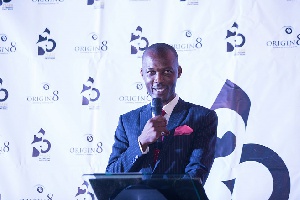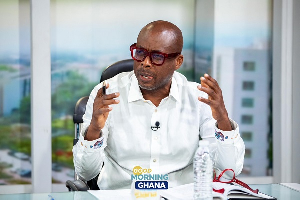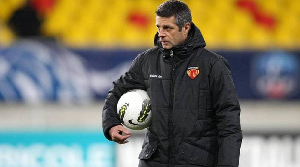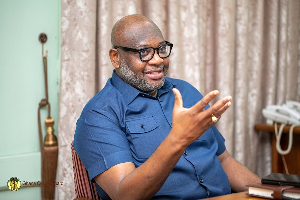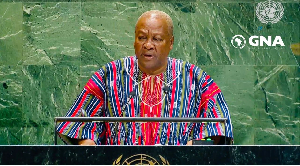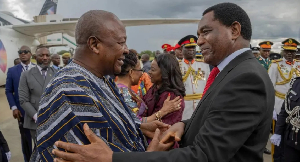“Coaching helps you take stock of where you are now in all aspects of your life, and how that compares to where you would like to be,”Elaine Macdonald(www.wiseoldsayings.com/coaching-quotes, 03/10/2018 at 14:58GMT)
Contextually, A Ghana Beyond Aid without a coach will lack a baseline. The President from his submissions so far is towing the line of marketers in the creation and execution of creative ideas. Is it intentional or a coincidence or the president has a marketing coach?
We have heard the slogan Ghana Beyond Aid which is gradually becoming a mantra that everyone is talking about. Many people have asked whether it will be possible now or in the near future for an individual, organization or government in Ghana to live without any form of aid. This is why we all need clarity about the slogan. It is in this same vein that the former president, Mr JA Kufuor, was misconstrued as saying we should be careful of the mantra because we cannot exist without aid, as a country.
Larry Bossidy & Ram Charan with Charles Burck in their book “Execution” stated clearly that the three processes – people, strategy, and operations- remain the building blocks and heart of good execution. This means to execute A Ghana Beyond Aid we need PEOPLE, STRATEGY AND OPERATIONS.
To situate this quotation in the context of Ghana Beyond Aid, which has become the mantra of the current government, the first question is whether we have the human capital to take Ghana beyond Aid. In developing countries, unemployment levels are usually equated to the availability of human capital and not the quality. We find countless number of Africans travelling to the Middle East and parts of Asia to undertake menial jobs in homes and factories due to the absence of the human capital in those countries. This does not mean there no unemployed indigenes, but then they do not have these skills or have their skill sets developed beyond these jobs.
Civil Society Groups in Ghana as usual have started asking for the blueprint for the agenda and the government has responded by setting up a committee to come up with the document. This brings to the fore the question of people. Was the mantra used by the President as a TEASER?
To answer this question from a marketing perspective, we suspect that the President of Ghana probably took a marketer’s advice which supported the creation of awareness first, then getting the people to put the document together. Once the awareness caught on, then the product itself is designed, developed and unveiled. In marketing, we usually start with a teaser. Was the president giving us a teaser to whet our appetite to ask for the main meal? Or genuinely, the agenda was unplanned until civil society groups began to ask for the document?
The second most important part of execution is strategy. Strategy within the context of A Ghana Beyond Aid would refer to the choice that Ghana wants to make to remain competitive among its peers. The choice we make should be informed by analysis and understanding of the global financial and economic environment and our own environment. What will be the risk of exposure for the country should we take a particular path? We all need to scrutinize the document to be sure that there are specific choices and decisions across sectors of the economy that the government of the day intends to make. Should these choices be made, will they lead us to A Ghana Beyond Aid?
In Marketing, we call this choice the BIG IDEA. What is the president’s BIG IDEA then? Should we guess or will it be spelt out in the document to be unveiled? The BIG IDEA should be understood by everyone who is to play a role in the agenda. The BIG IDEA should have a clearly defined goal or objective; it should tell us the target audience; how the target audience will be reached; what it wants the target audience to do or feel when they hear it; and the mandatory benchmarks to be achieved within a certain timeframe.
That means the success of A Ghana Beyond Aid does not rest in the arms of the political leadership. Its success or otherwise will depend on the total acceptance of the document by Ghanaians. Do we have a budget to ensure that Ghanaians across the country are educated on the agenda, and will there be specific benchmarks to assess the effectiveness or otherwise or are we going for the usual Ghanaian plans which are time bound but have no benchmarks towards reaching the goal?
The last issue here is the operation of the agenda. The execution of any plan like we mentioned is determined by the people, the strategy and the operations. Are we planning for the tools or logistics needed to make Ghana Beyond Aid workable? What are these possible tools?
Are we planning the type of architecture that will contain A Ghana Beyond Aid?
In operations, we need to know clearly who the Account Manager is as we infer from Marketing terminology. This is the person who should or will be held accountable should anything go wrong. He or she is not an Accountant but accountable to the success or failure of the process. Or are we designing the usual Ghanaian plans which do not take care of responsibility?
What will be the time intervals for the review, or are we marching straight to the end? Typically, there are no reviews for plans designed and implemented in Ghana to ensure that we change tactics where possible to make the strategy sharper and effective. Due to the absence of reviews, we completely forget about such plans over time, resulting in their natural deaths quietly thereafter. Examples are the 7-year Development Plan; 5-Year Development Plan; Vision 2020, and recently, the 40-year Development Plan. What do we do in years 1, 2,3 etc?
A good strategy should be reviewed periodically. Do we have the new skills set required for the agenda? We may have the people, but not necessarily the skill set.
The Marketing Coach of the President should peep into the yet to be unveiled document and find out if each objective set has clearly defined goals; the steps towards achieving the goals; the sectors that will be affected; how we are going to inform citizens of their roles; what are the mandatory elements in the document and the time limits; what the review intervals will be; what the expected deliverables are prior to each review session; how the President wants each Ghanaian to think and feel when he or she hears A Ghana Beyond Aid; and what the expected figures are in terms of macroeconomic performance, sector growth, exchange rate, interest rate; etc.
As Ghanaians, we have a collective role, irrespective of the professional expertise we possess, to ensure that we make Ghana a country we wish to live in.
The writer is the Chief Executive Officer of Origin8, one of Ghana’s leading Advertising, Marketing, PR and Events company.
Opinions of Wednesday, 10 October 2018
Columnist: William Y. Ansah

